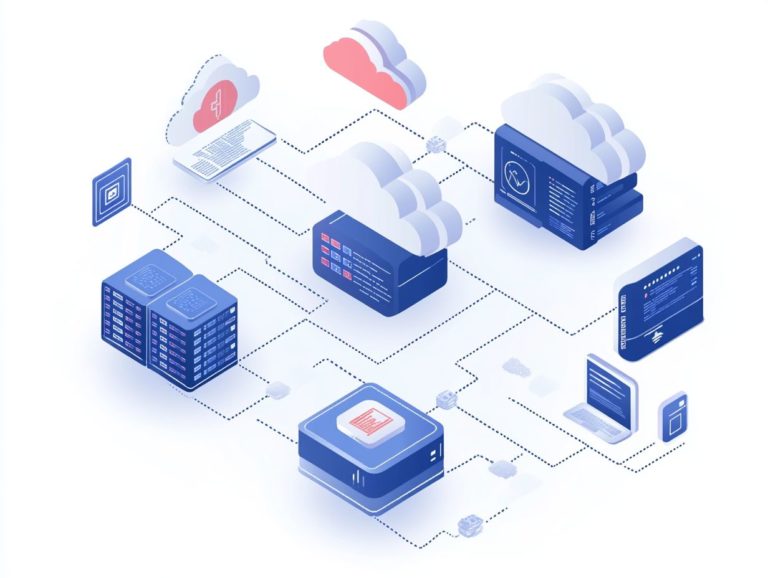Top 5 Benefits of Hybrid Cloud for Businesses
Are you ready to transform your business with innovative technology? In today’s fast-paced digital landscape, you are likely on the lookout for solutions that can enhance efficiency, reduce costs, and ensure robust security for your business.
Hybrid cloud technology is emerging as a game-changer, offering a unique blend of flexibility and scalability that can meet your organization’s diverse needs.
This article will delve into the top five benefits of hybrid cloud, including its cost-effectiveness, enhanced security measures, and improved collaboration opportunities.
You’ll discover what hybrid cloud really is, the various models available, and the key considerations for successful implementation.
Join us as we explore the potential of hybrid cloud for businesses of all sizes, unlocking new possibilities for your operations.
Contents
- Key Takeaways:
- 1. Flexibility and Scalability
- 2. Cost-Effective Solution
- 3. Enhanced Security Measures
- 4. Increased Reliability and Redundancy
- 5. Improved Collaboration and Communication
- What Is Hybrid Cloud and How Does It Work?
- Frequently Asked Questions
- What is hybrid cloud and why is it beneficial for businesses?
- What are the top 5 benefits of hybrid cloud for businesses?
- How does hybrid cloud help with scalability?
- What security advantages does hybrid cloud offer businesses?
- How does hybrid cloud save businesses money?
- What makes hybrid cloud more flexible than traditional IT systems?
Key Takeaways:

2. The hybrid cloud offers cost-effective solutions for businesses by allowing them to use both public and private cloud resources based on their specific needs and budget.
3. With enhanced security measures, the hybrid cloud provides businesses with a secure environment for storing and managing sensitive data and applications.
1. Flexibility and Scalability
The hybrid cloud model provides exceptional flexibility and scalability. It allows your enterprise to effortlessly adapt its IT infrastructure to dynamic market demands.
With the support of cloud service providers, you can efficiently manage your resources across both public and private cloud environments. This adaptability is crucial for organizations like yours that need to swiftly adjust resource allocation to meet varying workloads.
By enhancing overall operational efficiency, the ability to move workloads between cloud environments enables you to optimize your IT strategies. This ensures that your cloud-native applications can be deployed and scaled as necessary.
Collaboration among your DevOps teams is key in fine-tuning these environments. By using automation and continuous integration practices, they can streamline development processes effectively.
By cultivating a culture of agility, hybrid cloud solutions give you the power to innovate and respond to emerging opportunities without sacrificing performance or stability.
2. Cost-Effective Solution
Using a hybrid cloud strategy can save you money by allowing you to blend private and public cloud services. This approach optimizes your IT investments through cloud migration while minimizing the risks of vendor lock-in.
By embracing Infrastructure as a Service (IaaS), which lets you rent IT infrastructure instead of buying it, Software as a Service (SaaS), which simplifies software management, and Platform as a Service (PaaS), which provides tools for developers without the hassle of managing the infrastructure, you can easily scale your resources based on demand.
For example, imagine a retail business utilizing IaaS during peak shopping seasons to manage the surge in traffic. Then, they can scale back during quieter periods to keep costs in check.
SaaS solutions simplify your software management and updates, granting your IT teams the freedom to focus on strategic initiatives rather than routine maintenance. Likewise, PaaS can spur innovation by equipping developers with essential tools.
3. Enhanced Security Measures
Hybrid cloud architecture significantly enhances your security measures. It ensures that sensitive data remains protected while complying with various regulations.
This setup empowers you to quickly establish strong disaster recovery plans through advanced data governance practices. By integrating virtual private networks (VPNs), you can create secure communication channels that safeguard data in transit.
Navigating the complex regulatory landscapes, such as GDPR or HIPAA, is essential for maintaining compliance. This requires you to implement dynamic policies that govern data access and management effectively.
Striking the right balance between security and flexibility in hybrid cloud environments involves adopting layered security strategies. These ensure that sensitive data stays within compliant zones while still allowing agile access for authorized users.
This dual focus not only protects your vital assets but also enhances operational efficiency, driving innovation throughout your organization.
4. Increased Reliability and Redundancy

Hybrid cloud solutions enhance reliability and redundancy. This ensures your IT operations maintain uninterrupted service through effective disaster recovery and real-time monitoring.
These robust strategies include automatic backups, geographic distribution of data, and failover systems that effortlessly transition workloads during an outage.
By leveraging both public and private cloud resources, you can swiftly restore critical applications and data, thus minimizing downtime.
The incorporation of real-time monitoring tools enables your IT team to identify anomalies and potential failures before they escalate into significant issues. This maintains operational integrity and reinforces overall resilience.
This proactive approach protects business continuity and instills greater confidence in your organization s ability to manage disruptions effectively.
5. Improved Collaboration and Communication
Hybrid cloud environments elevate collaboration and communication, allowing you to work seamlessly across platforms while leveraging cloud-native applications and maintaining robust network connectivity.
These environments cultivate a flexible workspace where you and your team can access shared resources from virtually anywhere, dismantling traditional barriers that often impede productivity.
The use of cloud-native applications further enhances this dynamic, offering tools specifically crafted for scalability and adaptability. This makes it easier for you to pivot in response to evolving project demands.
DevOps teams, which combine development and operations to improve software delivery, are pivotal in streamlining workflows. They enhance the deployment of applications across diverse environments.
This synergy cuts downtime significantly and nurtures a culture of continuous improvement and innovation, ultimately propelling your organization toward better results.
What Is Hybrid Cloud and How Does It Work?
Hybrid cloud offers you a sophisticated cloud computing environment that elegantly merges public and private clouds. This powerful combination allows your organization to manage its IT infrastructure with remarkable efficiency, tapping into the strengths of both models while ensuring seamless automation and data synchronization across different environments.
This system gives you the power to harness the scalability and cost-effectiveness of public clouds while retaining control and security through private clouds. By integrating these two environments, you can allocate resources tailored to specific workloads, ensuring optimal performance and unparalleled flexibility.
Automation is pivotal in this setup, streamlining operations, enabling rapid deployment, and simplifying service orchestration. With efficient data synchronization between these clouds, you can keep critical information updated, fostering well-considered choices and driving innovation in an ever-evolving digital landscape.
What Are the Different Types of Hybrid Cloud Models?
You ll find several distinct hybrid cloud models, each designed to meet the unique needs of your organization by blending elements of public cloud, private cloud, IaaS, SaaS, and PaaS. This approach creates a flexible and efficient cloud environment tailored just for you.
These models empower your business to optimize existing resources while boosting scalability and security. For example, consider a model that leverages the public cloud for non-sensitive data processing, paired with a private cloud for critical workloads. This combination helps you maintain compliance and privacy without compromise.
Utilizing IaaS can enable you to expand your infrastructure swiftly and affordably, while SaaS solutions provide user-friendly options that your employees can easily embrace. PaaS makes it easier to develop applications by enabling smooth integration and deployment, accelerating your digital transformation and enhancing agility in today s fast-paced market.
Explore how hybrid cloud solutions can elevate your organization today!
What Are the Key Considerations When Implementing a Hybrid Cloud?

When you start using a hybrid cloud, it s essential to consider several key factors: compliance requirements, the risk of being stuck with one provider, and effective data management practices to ensure robust security.
Pay careful attention to the regulatory frameworks that govern data storage and transmission. The repercussions of non-compliance can be quite significant. Establishing clear governance structures is vital, ensuring that every team understands their responsibilities regarding data protection.
To mitigate risks, adopt a multi-layered security approach, combining both on-premises and cloud defenses. Training your employees on best practices for data handling and implementing stringent access controls will further enhance your security posture.
Seamless integration between public and private clouds is crucial for maintaining performance and accessibility. Thus, selecting the right tools and platforms is imperative for achieving a fluid operational flow.
What Are the Common Challenges of Using Hybrid Cloud?
Organizations encounter several challenges when navigating hybrid cloud solutions, such as integration complexities, security measures, and maintaining network connectivity while ensuring robust data governance.
These challenges can lead to increased operational overhead and disrupt the seamless flow of data across various systems. Integration issues often arise when connecting on-premises infrastructure with cloud services, complicating the overall architecture and necessitating specialized expertise.
Security concerns take center stage, especially when sensitive information must be transferred between environments. It s essential to implement strong encryption and compliance protocols.
Effective connectivity is vital to ensure all system components work together. Without a well-structured approach to data governance, you risk facing regulatory penalties and potential data breaches. This underscores the importance of these factors in achieving a successful hybrid cloud strategy.
How Can Hybrid Cloud Benefit Small and Medium-Sized Businesses?
You can unlock tremendous benefits from hybrid cloud solutions, including scalability and cost efficiency while enhancing your data management capabilities and overall IT infrastructure.
By seamlessly integrating both public and private cloud resources, you can effortlessly scale your IT operations to adapt to fluctuating demands, all while keeping expenses in check.
For instance, during peak seasons, your retail operation can swiftly boost computing resources without the long-term commitments tied to on-premise infrastructure.
Enhanced data management paves the way for improved analytics and decision-making, giving you the power to respond quickly to market trends. This agility supports your operational growth and provides a competitive edge in an ever-evolving landscape, nurturing innovation and elevating customer satisfaction.
What Are the Future Trends for Hybrid Cloud Adoption?
As technology continues to evolve, expect future trends in hybrid cloud adoption to revolve around greater reliance on edge computing, enhanced automation, and more effective data synchronization strategies designed to meet your growing demands.
This shift stems from the need for businesses like yours to process data closer to where it s created, significantly reducing latency and elevating real-time decision-making.
Automation tools will become essential, streamlining your operations and allowing your IT team to concentrate on strategic initiatives instead of getting bogged down in routine tasks.
With robust data synchronization methods in place, you ll ensure that information remains consistent across various platforms, fostering seamless collaboration and operational efficiency.
Together, these innovations are poised to redefine your IT infrastructure, giving your business the power to be more agile and responsive in an increasingly digital landscape.
Frequently Asked Questions

What is hybrid cloud and why is it beneficial for businesses?
Hybrid cloud combines private and public cloud services. This allows businesses to store and manage data flexibly and cost-effectively.
What are the top 5 benefits of hybrid cloud for businesses?
Hybrid cloud offers five key benefits:
- Increased scalability
- Improved data security
- Cost savings
- Flexibility
- Enhanced operational efficiency
How does hybrid cloud help with scalability?
Businesses can easily adjust their resources with hybrid cloud. This flexibility allows them to meet changing demands without costly hardware investments.
What security advantages does hybrid cloud offer businesses?
Hybrid cloud enhances security by combining private and public services. Sensitive information can be stored securely in a private cloud, while less critical data can use the public cloud.
How does hybrid cloud save businesses money?
Businesses only pay for the resources they need, leading to significant savings. The flexible nature of hybrid cloud also means they can scale up or down as necessary, cutting unnecessary costs.
What makes hybrid cloud more flexible than traditional IT systems?
Hybrid cloud lets businesses choose where to store and manage their data. This approach meets unique needs by using both private and public cloud services, without being tied to a single provider.






